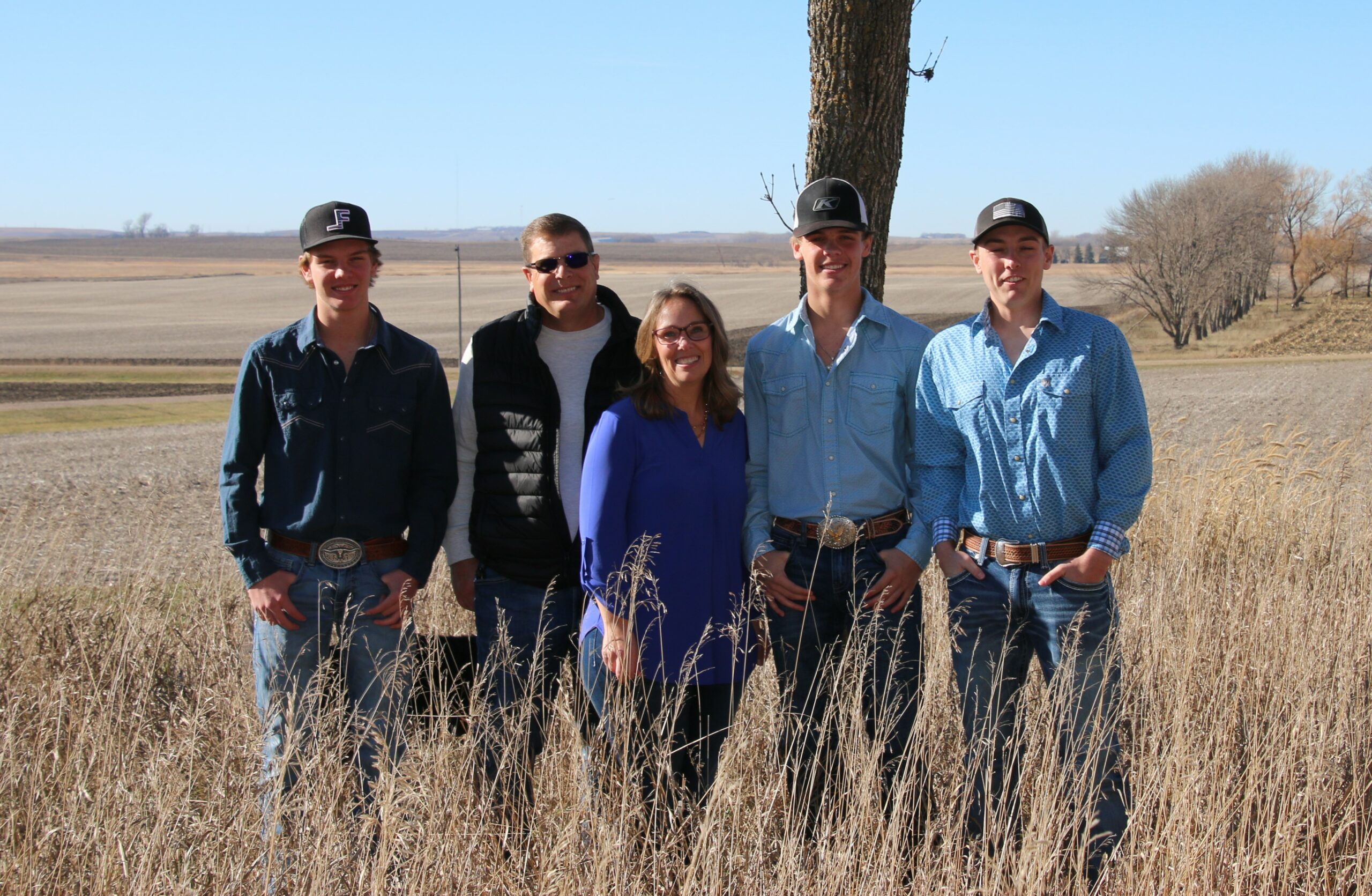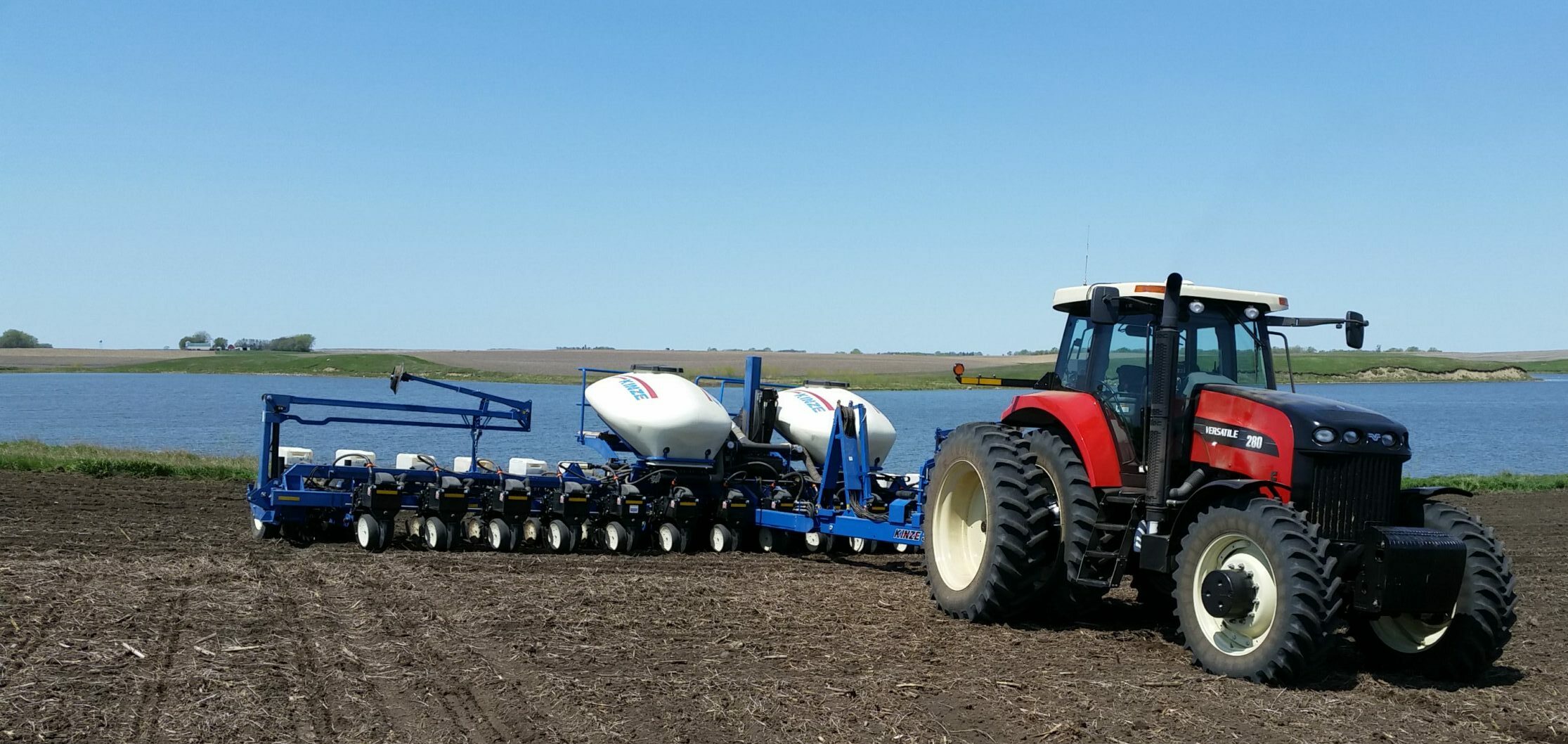

Wade Egger didn’t grow up on the farm, but that didn’t stop him from becoming a farmer.
Although today the 52-year-old is part of the Hillside Acres farming partnership near Colton, South Dakota, Wade didn’t get his first taste of farm life until he entered the workforce as a high school freshman in the late 1980s.
At that time, Wade held two jobs – one at the local grocery store, the other as summer help for local farmers, including his grandfather and uncle on the family acreage.
“The first beans I walked were for my grandpa and my uncle, Fred and Bob Mews,” Wade said. “That gave me a little exposure to farm life.”
After a couple years, Wade moved on from the grocery store and started working for a local farmer, Doug Van Duyn, tending to livestock on the feed lot while helping with a few quarters of land. That’s where his education in agriculture truly began.
“I did everything I could,” he said. “I fed cattle, treated cattle, handled manure, did tillage – whatever he needed me to do, I did it. I was the only hired hand the majority of the time, so I did whatever needed to be done.”
In addition to learning the ins and outs of daily operations, Wade’s time on the Van Duyn farm also brought him knowledge and firsthand experience of the financial and operational impact brought by mistakes. He particularly recalls a lesson learned following a windstorm that downed some trees shortly after he started the job – and the reaction of his boss when he damaged some equipment while removing fallen branches.
“I was using Doug’s loader to carry off the trees, and I snapped the front wheel off the tractor; I snapped the spindle,” Wade said. “He didn’t chew my butt out. He just showed me what I did wrong. We got the tractor up to the shop, fixed the tractor and spindle, and then he showed me the expense of it. I expected a butt-chewing and didn’t get one. He just showed me what I did wrong and helped me understand what it cost him that day.”
Wade would continue working with Van Duyn after graduating from high school in 1991. Following a two-year stint building firetrucks, Wade decided to ask Grandpa Fred if he could rent a quarter from him, and he worked together with Van Duyn to begin farming on that piece.
“I worked with Doug for quite a few years, and I liked working with him,” Wade said. “Doug helped me get started, and he and I farmed that quarter for a year or two. Then, my future father-in-law asked me if I wanted to farm with him, so I thought that might be a better place for me in the long term.”
While still in high school, Wade began dating his future wife, Holly Swier. Within a few short years of graduating, the couple got engaged. Holly was one of three sisters, and farming didn’t appear to be part of her siblings’ desired futures. Meanwhile, Holly’s parents, Glen and Nancy, were the sole operators and were trying to determine the succession plan of their operation. Knowing Wade had some experience working on farms – and once the engagement to Holly was on – they approached him to see if he was interested in joining them.
Wade agreed, and he started working with Glen and Nancy in the spring of 1997, just a couple months ahead of his and Holly’s July nuptials. At the time, the farm covered about 2700 acres raising an equal rotation of corn and soybeans, including Wade’s grandpa’s quarter that he’d been farming. Although he’d come into the operation with a bit of experience, there was still a gap of knowledge and material Wade had to overcome.
“It was a learning curve,” Wade said. “Glen had bigger machinery, more land, a semi. I knew the work, but I didn’t know the ins and outs of the financial end of it, so I had a lot to learn.”

“When we got married, my wife was still going to college and things were tight. I had a motorcycle, a classic car, and a newer pickup at the time. I had to sell all that stuff off and go to the bank to get an operating note. We were tight for money, but I think everybody is when you first get married and while getting into a business.”
Eventually, Wade and the Swiers brought the farm into a corporation, Hillside Acres, to allow for the succession of the business. As the years have passed, Hillside Acres has placed a greater emphasis on making the most out of every acre, especially regarding fertility. When Wade first joined the operation, it consisted of about 2700 acres; today, after dropping some rented ground, that number has been reduced by about half, but he doesn’t view the reduction in acres as a negative.
“We looked at the breakeven on a fair portion of our rented ground and decided we didn’t want to work hard and put wear and tear on our equipment just for someone else to make money,” Wade said. “There’s a lot of farmers that seem like they just want to farm a big number. I just want to make a good living and spend time with my wife and kids. Besides, we make more bushels overall today than we ever did back when we were farming 2700 acres.”
Wade gives at least partial credit for their increased success to the guidance Hillside Acres has received from Hefty Seed Company agronomists over the years. In particular, he calls out Rob Fritz from the Baltic location as being especially helpful. They first contacted him one season in the late 1990s when trying to diagnose a problem in their fields related to an ag chemical application.
“We had some issues with chemicals not working,” Wade said. “We had been dealing with the local elevator up to that point, so we tried getting them out to look at it. We couldn’t get them to come out and look at it, so we called Hefty’s. Rob came right out.”
That willingness to provide information and give advice even on crop issues unrelated to a product purchase made a positive impression on Wade.
“They wanted to work with us, and they treated us right,” he said. “They were willing to come to us even when it wasn’t their butt on the line. If I have a problem and Rob can’t answer it, he finds the answer to it – and Rob knows a lot. He’s very knowledgeable on everything. That’s what sold us on Hefty’s.”
That relationship would continue to grow over the coming decades, with Hillside Acres eventually moving to procure 100 percent of their crop inputs from Hefty Seed Company. The operation is also part of the company’s network of seed grower partners, having raised seed for Hefty Brand Soybeans for the past 15 years.
“It’s good quality seed that comes out of Hefty’s,” Wade said. “Everything we’ve gotten, I’ve been really happy with. I can’t say one bad thing about Hefty’s. Dealing with Rob and everyone over there, they always stand behind their products, no matter what. Between the quality of seed and workmanship over there, I do think Hefty’s is a big part of the reason we’re where we’re at today.”
For farmers like Wade, a partnership like that is important, especially as his family’s operation continues to strive for success both now and as it looks to the future.
“I love what I do,” he said. “I love being on the farm, setting my own hours, doing my own thing. I’m happy, and I think my boys are happy. They all talk like they want to be a part of the farm together, too. If they do that, I’m going to be super happy.”

